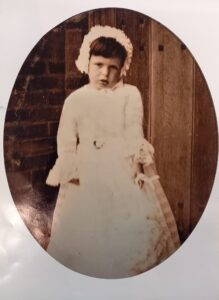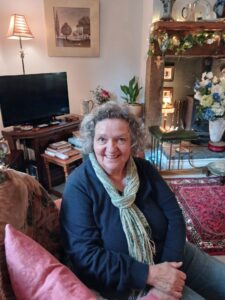
21 Jan 2025
“Tracey was only their seventh patient”: Tracey’s Story
The drug Doxorubicin (Adriamicyn) is nowadays a standard treatment for many childhood and adult cancers including one of the most common childhood cancers – leukaemia. Back in 1970, this treatment was still new. Little Tracey Brooke was amongst the first children to receive it.
Here, Tracey’s Mum Brenda Wilkinson remembers her daughter and the legacy she left.
 “Tracey was 17 months old and my son just three weeks old when she presented with her first symptoms of leukaemia in January 1970. I was 20 and living in Bradford. She was a normal, healthy and lively little girl up until that time. But she started to get very tired and say she felt sick. And then I spotted red ‘Koplik’ spots in her mouth – like a rash on her tongue and gums.
“Tracey was 17 months old and my son just three weeks old when she presented with her first symptoms of leukaemia in January 1970. I was 20 and living in Bradford. She was a normal, healthy and lively little girl up until that time. But she started to get very tired and say she felt sick. And then I spotted red ‘Koplik’ spots in her mouth – like a rash on her tongue and gums.
“In early February I took Tracey to the baby clinic for her first inoculations. Within 36 hours she became very listless and pale. We rang the GP. He got us an appointment at the Bradford Children’s Hospital two days later with a paediatrician. Tracey was critically ill by then and we were immediately admitted for a blood transfusion.
“Life in hospitals was different then. We were expected to leave her at the end of visiting hours which was heart-wrenching. She was just a baby, my baby, what if she needed a drink or a cuddle or cried for me? That first night was one of the most awful nights of my life.”
“After this followed four months of tests and uncertainty and going back and forth to hospital. At one point we were told they thought she had got hold of some rat poison in my home and eaten it. I was young with a poor education and didn’t challenge authority figures. But my house was clean and I knew it wasn’t this. I feared Tracey had leukaemia. My then-husband’s sister had died of leukaemia as a child ten years before. He had talked of her having yellowish whites in her eyes. This happened to Tracey just after her inoculations.
“In June she had a seizure and was readmitted to hospital. On June 8th 1970 we were finally told Tracey had acute lymphoblastic leukaemia (ALL). I knew it was a life limiting disease, and the stark horror of the knowledge Tracey would die at some point relatively soon seemed unbearable and terrifying.
“Tracey was transferred, along with myself and her Daddy, to Seacroft Hospital in Leeds where a relatively new unit was waiting for us. Tracey was only their seventh patient. After the most horrendous few months we finally stepped into a warm, welcoming and reassuring environment.
“From the senior physician, Dr Catherine Haworth, through to the kindest healthcare assistants, we were supported every step of the way. The doctors explained everything clearly and honestly. In those days children with a diagnosis of ALL had a life expectancy of two years. And so it eventually proved.
 “Tracey was treated swiftly, efficiently and kindly. But the following six months were a battle of treatments, bone marrow tests and, worst of all, lumbar punctures. We had 20 months of remission, another acute episode, and remission again. She managed to be a bridesmaid at my sister’s wedding in late 1971 and looked so pretty. Unfortunately, she became ill later that evening and never recovered.
“Tracey was treated swiftly, efficiently and kindly. But the following six months were a battle of treatments, bone marrow tests and, worst of all, lumbar punctures. We had 20 months of remission, another acute episode, and remission again. She managed to be a bridesmaid at my sister’s wedding in late 1971 and looked so pretty. Unfortunately, she became ill later that evening and never recovered.
“Finally I was told ‘Sadly the treatments are no longer working’. But then a relatively new drug was brought up from London called Adriamicyn. It was the last line of defence against the disease. In fact the doctor administering the injection told me he had not used it before. But we gave our consent – we were willing to try anything.”
Adriamicyn, also known as doxorubicin, a chemotherapy drug introduced in 1970, was initially used to treat leukaemia and quickly became a staple in cancer therapy. Today, it is commonly used to treat both solid and blood cancers in children and adults, playing a key role in the treatment of over ten different cancers. The most common regimen for children includes high-dose methotrexate, doxorubicin, and cisplatin, making the combination a powerful tool in the fight against cancer.
But sadly the drug did not work for Tracey, who died peacefully and pain free at Seacroft Hospital on 5th February 1972 aged just 3 ½.
 “After losing Tracey I went to night school and used my life experience I became a qualified Mental Health Social Worker which was my career for 37 years. I retired during Covid aged 71. I used what I had gone through with Tracey to support others. Prior to being ill and throughout her illness Tracey was a delightful, happy, spirited, feisty little girl. She would have been 56 now, maybe with children of her own. For the short time we had her she brought us untold joy which was worth all the pain of her illness.”
“After losing Tracey I went to night school and used my life experience I became a qualified Mental Health Social Worker which was my career for 37 years. I retired during Covid aged 71. I used what I had gone through with Tracey to support others. Prior to being ill and throughout her illness Tracey was a delightful, happy, spirited, feisty little girl. She would have been 56 now, maybe with children of her own. For the short time we had her she brought us untold joy which was worth all the pain of her illness.”
“Now I know around four out of five children diagnosed with ALL today have a good chance of survival thanks to Adriamicyn and other medications now available thanks to research. I like to think she played no small part in helping those children who now go on to recover. Back then they were at the trial stage and needed to understand more about the children that this would work for, and the effects the drug had.
“Tracey’s memory is woven like a golden thread into my heart and soul. Talking about her like this has brought her alive for me again. I salute all the dedicated professionals who continue to work on a 100% cure for leukaemia.”
Related posts
1 August 2022
One Cancer Voice writes to Sajid Javid ahead of 10-Year Cancer Plan
Today, with over 50 cancer charities, we wrote to the Secretary of State for Health & Social Care, Sajid Javid, to set out our expectation for next month’s 10-Year Cancer Plan….
28 November 2022
Leukaemia UK John Goldman Fellow awarded Professorship
Talented blood cancer researcher, Vignir Helgason, was awarded a Leukaemia UK John Goldman Fellowship in 2015, for his research into chronic myeloid leukaemia (CML). Since then, his research career has…
6 June 2022
An open letter to people with a weakened immune system
Leukaemia UK joins the NHS and other charity leaders by signing an open letter, to encourage people with a weakened immune system to continue to book in or visit a walk-in centre for their Covid-19 vaccines.
25 May 2022
Leukaemia UK reveals new strategy to go further than ever to stop leukaemia devastating lives
Leukaemia UK has revealed a new strategy to go further than ever to save and improve more lives, through research, awareness and advocacy.